MASNEWS 01/2007: The Next Generation
Family Reunion in Heidelberg
Inside MAS: The First Contact
Life after the MAS
MAS 2008: New Scholarships Available
HCA Annual Report 2005/06
HCA Spring Academy 2008
HCA Spin-Off
HCA Call for Papers
Dear all,
 The Heidelberg Center for American Studies (HCA) at the University of Heidelberg wishes you a very happy and successful year 2007!
The Heidelberg Center for American Studies (HCA) at the University of Heidelberg wishes you a very happy and successful year 2007!
We are proud to say that the HCA’s M.A. in American Studies (MAS) program can look back on a very successful year 2006. The “MAS family” is constantly growing: last October we graduated our second class, the MAS Class of 2006 and welcomed the MAS Class of 2007 to Heidelberg. Additionally, we inaugurated the new Ph.D. in American Studies program. The HCA offers ideal conditions for postgraduate and graduate students. The MAS is an exclusive, interdisciplinary one-year program taught in English. Taught by internationally renowned scholars, the MAS offers “inside knowledge with an outside perspective”, attracting students from around the globe.
To find out how to become a member of the MAS family in the MAS Class of 2008 and how to apply for your year in Heidelberg, please click here . To learn more about the MAS, the Ph.D. in American Studies, and about our other activities, please enjoy reading this newsletter. Please feel free to forward our newsletter to anyone interested in American Studies. Of course, we appreciate any feedback you would like to share with us.
Many thanks and best wishes,
Prof. Dr. Dr. h.c. Detlef Junker
HCA Founding Director
Family Reunion in Heidelberg: The Graduation of the MAS Class of 2006
On October 27, 2006, the HCA celebrated the achievements of the second class of its M.A. in American Studies, the MAS Class of 2006. Simultaneously, we welcomed the MAS Class of 2007 to our program in Heidelberg.
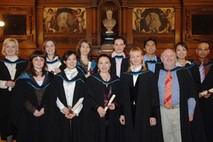 The MAS family now has 17 new members. Of the graduates, hailing from Belarus, Canada, China, Georgia, Japan, Kyrgyzstan, the Maldives, Mexico, Poland, Peru, Romania, Ukraine, and the United States of America, 12 made their way to the celebration in Heidelberg some of them bringing along their family and friends. As during the first graduation, the HCA continued its efforts to re-establish the tradition of wearing formal academic attire on such an occasion. Graduates as well as HCA faculty and staff wore traditional gowns and hoods for the ceremony. In her commencement speech Anne Applebaum, columnist and member of the Editorial Board of the Washington Post . Ms. Applebaum compared the U.S. reaction to the Hungarian Revolution in 1956 to the way the U.S. currently is promoting democracy abroad. You can find a more detailed abstract of Ms. Applebaum’s lecture Democratization in 1956 and in 2006: Has American Foreign Policy Changed? in the HCA Annual Report 2005/06 (PDF, 1.6 MB).
The MAS family now has 17 new members. Of the graduates, hailing from Belarus, Canada, China, Georgia, Japan, Kyrgyzstan, the Maldives, Mexico, Poland, Peru, Romania, Ukraine, and the United States of America, 12 made their way to the celebration in Heidelberg some of them bringing along their family and friends. As during the first graduation, the HCA continued its efforts to re-establish the tradition of wearing formal academic attire on such an occasion. Graduates as well as HCA faculty and staff wore traditional gowns and hoods for the ceremony. In her commencement speech Anne Applebaum, columnist and member of the Editorial Board of the Washington Post . Ms. Applebaum compared the U.S. reaction to the Hungarian Revolution in 1956 to the way the U.S. currently is promoting democracy abroad. You can find a more detailed abstract of Ms. Applebaum’s lecture Democratization in 1956 and in 2006: Has American Foreign Policy Changed? in the HCA Annual Report 2005/06 (PDF, 1.6 MB).
Please take a look at our MAS Graduation 2006 presentation to get a personal taste of the historic setting, the academic rituals and our MAS class of 2006 (QuickTime Movie, 4.3 MB).
The new MAS Class consists of 16 students from all around the world. They come from China, Germany, Georgia, Japan, the Kyrgyz Republic, Romania, Russia, Ukraine, and the United States. To learn more about the MAS Class of 2007, please click here . If you would like to become a part of the MAS family, please visit www.mas.uni-heidelberg.de to apply online.
Inside MAS: The First Contact
Mao Jiawei from Beijing in China reports, how he experienced his first Thanksgiving. Mao joined the MAS in October 2006 and prepares now for his end of term exams in February.
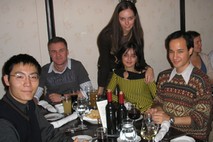 Such is the human nature that virtually everybody has a propensity of cherishing the first-times. On Thursday, Nov. 23rd, I was soaked in curiosity when I stepped into a typically German style restaurant near the Heidelberg shopping destrict, waiting, somewhat impatiently, for the drama of “my first Thanksgiving Dinner ever” to stage.
Such is the human nature that virtually everybody has a propensity of cherishing the first-times. On Thursday, Nov. 23rd, I was soaked in curiosity when I stepped into a typically German style restaurant near the Heidelberg shopping destrict, waiting, somewhat impatiently, for the drama of “my first Thanksgiving Dinner ever” to stage.
It was a beautiful evening with a temperate weather, and the restaurant which the HCA staff chose for this occasion was more than perfect for me to embark on my virgin exploration into the colorful world of Thanksgiving culture. Sitting in a carefully decorated restaurant, talking to people around me and tasting fresh turkey, I could not help contemplating upon Samuel P. Huntington’s thesis on “Clashes of Civilizations”, of which our dinner tonight could be a perfect antithesis—-it could be clearly perceived in how much I myself, as a student from the other side of the Eurasian landmass, exuberantly enjoyed such an exotic setting, without recourse to the fact of a purely international composition of the MAS and PhD student bodies as well as the HCA staff.
The party reached a climax when Prof. Junker delivered a short address to the audience. He pointed out the fact that is all too easy to be consigned to oblivion, that we are “living in peace, well-fed, well-clothed, and well-sheltered”, for which we have every reason to feel as grateful as the farmers in New England did centuries ago.
Living against the background of an increasingly globalized world, important days and festivals have transcended the boundaries of nationalities and take on a cosmopolitan crown. It’s therefore not surprising that my first close contact with Thanksgiving was in the Fatherland of Beethoven and Goethe. What surprised me indeed, is that the festivity thereof and its sheer power of organically linking people of different races, religions and culture backgrounds together in a familial atmosphere is even omnipresent than ever felt in the pre-globalization era.
Life after the MAS
Amy Foster Parish (MAS 2005) shares with us her experiences in the first ever MAS class in 2005. Now Amy is one of the Heidelberg Center for American Studies’ first Ph.D. students. The current working title of her thesis is: Petticoat Governments: Representations of Female Presidents in American Fiction and Film.
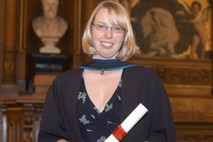 When my American friends and family first learned that I was planning to get a Master’s degree from a German university – especially a university as prestigious as Ruprecht-Karls-
When my American friends and family first learned that I was planning to get a Master’s degree from a German university – especially a university as prestigious as Ruprecht-Karls-
Universität – they were universally impressed. My husband and I were already planning a move to Heidelberg in conjunction with his work in the U.S. military, and the opportunity for me to further my education while we were there was serendipitous to say the least. However, when those same friends and family learned of my degree program – American Studies – their supportive smiles turned a bit quizzical. I even got some chuckles. After all, what’s the point of an American, born and raised in the United States, moving to Europe to study…America?
For me, a degree in American Studies made perfect sense, no matter the location. While finishing my bachelor’s degree in English literature, I had become interested in a more multidisciplinary approach to the study of modern American fiction. The program in American Studies gave me the opportunity to view such literature through the lens of politics and history, or in conjunction with the other cultural product of the time.
But the MAS offers something so much more important than a multidisciplinary approach to American culture; it offers a multidisciplinary approach with an outside perspective, and it is in that perspective that the true value of a degree from the HCA lies. Living in Germany, working with students from a variety of cultural and linguistic backgrounds, with an ocean and several thousand miles between you and the United States, you are taught a valuable lesson – to view yourself and your country as others view it. To see your experience – to see the American experience, if there is such a thing – through the eyes of your German or Iranian or Chinese peers. Whether or not you agree on what you see, it’s the seeing itself that makes all the difference; the true benefit is in realizing the cultural product that America is exporting and understanding how that product is perceived.
So chuckle all you want – it’s true that I am an American who moved from America to Europe to study America. And as confusing as that seems, I wouldn’t have it any other way.
If you are interested in further information on the Ph.D.@HCA, please visit the webpage of the Ph.D.
MAS 2008: New Scholarships Available
In addition to the full scholarships already available for the MAS 2008, starting in October 2007, the HCA acquired three tuition fee scholarships. These scholarships are: The Bernd A. von Maltzan Scholarship, the FHCA Scholarship, the Schurman Fellowship. All three scholarships provide the MAS tuition fee.
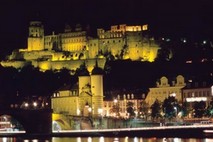 The first recipient of the Bernd A. von Maltzan Scholarship was Raluca Cimpean (Romania). Raluca graduated from the Faculty of Letters at the Babes-Bolyai University of Cluj-Napoca. Since her graduation Raluca has now begun working on her Ph.D. thesis: Camelot Revisited supervised by Prof. Manfred Berg . The FHCA Scholarship 2006 was given to Ekaterina Chixladze (Georgia). Eka previously studied at the Kutaisi State University and the Tblisi State University. “The MAS enhanced my experience and knowledge in American Studies, but more importantly I made friends with people from around the world.”, explained Eka. After her graduation, Eka is now working in a stock joint company back in Georgia. For Nurzada Joldoshbekova (Kyrgyz Republic) a dream came true when she heard that a tuition fee scholarship would allow her to continue her studies at the HCA after she graduated from the American University – Central Asia. If you also wish to come to Heidelberg for your graduate studies, please submit your scholarship application along with your MAS application
The first recipient of the Bernd A. von Maltzan Scholarship was Raluca Cimpean (Romania). Raluca graduated from the Faculty of Letters at the Babes-Bolyai University of Cluj-Napoca. Since her graduation Raluca has now begun working on her Ph.D. thesis: Camelot Revisited supervised by Prof. Manfred Berg . The FHCA Scholarship 2006 was given to Ekaterina Chixladze (Georgia). Eka previously studied at the Kutaisi State University and the Tblisi State University. “The MAS enhanced my experience and knowledge in American Studies, but more importantly I made friends with people from around the world.”, explained Eka. After her graduation, Eka is now working in a stock joint company back in Georgia. For Nurzada Joldoshbekova (Kyrgyz Republic) a dream came true when she heard that a tuition fee scholarship would allow her to continue her studies at the HCA after she graduated from the American University – Central Asia. If you also wish to come to Heidelberg for your graduate studies, please submit your scholarship application along with your MAS application
to the HCA before March 31, 2007. You will find further information on how to apply for the scholarships here.
Further News from the HCA
HCA Annual Report 2005/06
The HCA has published its Annual Report 2005/06 with the special feature Europe: Cultural Adjustment to a New Kind of Capitalism? by Prof. Harold James.
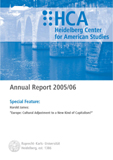 In the third year of its existence the HCA has made a giant leap ahead and moved into its new location the Curt and Heidemarie Engelhorn Palais, right in the historic city center of Heidelberg. Founding Director Prof. Detlef Junker summarized the advantages for the HCA: “Our MAS and Ph.D. students, tutors, teaching staff and guests have profited immensely from the creative atmosphere of the Palais. We are delighted to have been able to inaugurate the new Ph.D. in American Studies program in this wonderful setting. The Palais also is a great asset for the HCA in its role as public forum to host guest lectures. We have invented a new tradition to our public lecture series Typically American : our own fireside chats in the Palais’ beautiful Bel Etage.” To Junker, October was the most challenging month in the HCA calendar in 2006 because it saw the end of renovations in the Palais, the graduation of the MAS 2006 and the inauguration of the MAS 2007. Moreover, our large international conference State and Market in a Globalized World: Transatlantic Perspectives took place during this time. The conference was supported by Manfred Lautenschläger and featured a keynote address by U.S. Ambassador to Germany William R. Timken, Jr. For more information, please read the full HCA Annual Report as download (PDF, 1.6 MB).
In the third year of its existence the HCA has made a giant leap ahead and moved into its new location the Curt and Heidemarie Engelhorn Palais, right in the historic city center of Heidelberg. Founding Director Prof. Detlef Junker summarized the advantages for the HCA: “Our MAS and Ph.D. students, tutors, teaching staff and guests have profited immensely from the creative atmosphere of the Palais. We are delighted to have been able to inaugurate the new Ph.D. in American Studies program in this wonderful setting. The Palais also is a great asset for the HCA in its role as public forum to host guest lectures. We have invented a new tradition to our public lecture series Typically American : our own fireside chats in the Palais’ beautiful Bel Etage.” To Junker, October was the most challenging month in the HCA calendar in 2006 because it saw the end of renovations in the Palais, the graduation of the MAS 2006 and the inauguration of the MAS 2007. Moreover, our large international conference State and Market in a Globalized World: Transatlantic Perspectives took place during this time. The conference was supported by Manfred Lautenschläger and featured a keynote address by U.S. Ambassador to Germany William R. Timken, Jr. For more information, please read the full HCA Annual Report as download (PDF, 1.6 MB).
HCA Spring Academy 2008: American History, Culture, and Politics
20 Ph.D. students will meet in Heidelberg from April, 16 to 20, 2007. The selection process for the participants of the HCA Spring Academy 2007 is fully underway.
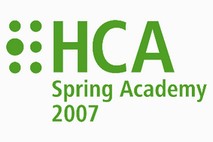 In April the HCA will host its forth annual Spring Academy. Most of our Participants are mostly Ph.D. Students in their second or third year who come from disciplines such as American studies, cultural and ethnic studies, history, international relations, law, literature, religious studies, political science and sociology. Since its inception the HCA Spring Academy has welcomed participants from 23 countries. Please feel free to consult reports of our previous events in our archive.. The HCA will accept proposals for our fifth Spring Academy starting in October 2007. An online application will be available at:www.springacademy.de.
In April the HCA will host its forth annual Spring Academy. Most of our Participants are mostly Ph.D. Students in their second or third year who come from disciplines such as American studies, cultural and ethnic studies, history, international relations, law, literature, religious studies, political science and sociology. Since its inception the HCA Spring Academy has welcomed participants from 23 countries. Please feel free to consult reports of our previous events in our archive.. The HCA will accept proposals for our fifth Spring Academy starting in October 2007. An online application will be available at:www.springacademy.de.
The first HCA Spring Academy took place April 26 – 30, 2004. Twenty four participants from eight European countries and the United States presented their research projects. Among the contributors were Prof. Hope M. Harrison (George Washington University), Prof. Crister S. Garrett (University of Wisconsin at Madison), and Prof. Andrew J. Bacevich (Boston University). Key themes of the presentations and workshops were issues ranging from
American identity and gender questions to U.S. history and foreign policy. The round table discussion was conducted by Prof. Detlef Junker (HCA), Prof. Thomas Risse (Free University of Berlin), Prof. Maurizio Vaudagna (University of Turin) and Prof. Serge Ricard (Sorbonne, Paris).
At the second HCA Spring Academy (February 28 to March 4, 2005) twenty young researchers from nine European countries and the United States presented their Ph.D. dissertations. The topics of the presentations and workshops varied from questions of American cultural anthropology and pop-culture to the Cold War and transatlantic relations. Contributors to the HCA Spring Academy 2005 included Dr. Dorothea Fischer-Hornung (University of Heidelberg), Dr. Raphael-Hernandez (University of Maryland in Europe), Dr. Giles Scott-Smith (Roosevelt Study Center, Middleburg, NL), and Prof. Kriste Lindenmeyer (University of Maryland in Baltimore). Most of the panels were moderated by Dr. Dorothea Fischer-Hornung and PD Dr. Philipp Gassert from the University of Heidelberg who were dubbed “Mr. and Mrs. Spring Academy” by the participants.
The most recent HCA Spring Academy was held from April 3 – 7, 2006. Twenty participants representing eleven European countries and the United States came to Heidelberg. The main topics discussed during that week’s sessions dealt with the questions of American minority literature, Native Americans, politics and rhetoric, public opinion, and religion in the United States. Dr. Dorothea Fischer-Hornung (University of Heidelberg), Prof. Julia Foulkes (New School New York), Prof. Robert Jewett (University of Heidelberg), and Dr. Markus Kaim (German Institute for International and Security Affairs) conducted workshops. As in the previous year, Dr. Dorothea Fischer-Hornung and Dr. Philipp Gassert (Mr. and Mrs. Spring Academy) chaired most sessions.
HCA Spin-Off: Athena Wissenschaftsmarketing, an agency for academic marketing
Since October 2006, the HCA and the University of Heidelberg feature yet another innovation: Athena Wissenschaftsmarketing, an agency for academic marketing. Athena is the newest spin-off of the University of Heidelberg and one of the very few that ever originated from the humanities.
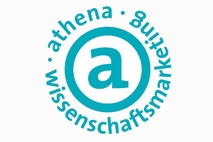 Having its sights set on the new challenges presented by the global educational market, Athena has already opened an office in the still young business park of the university. As an independent agency, Athena’s services are available to universities, departments, centers, or individual faculty chairs. The three founders, Christiane Rösch, Daniel Sommer and Dr. Alexander Emmerich, were previously long-time employees at the HCA. While Sommer continues to work at the HCA as a student assistant, Rösch and Emmerich will keep in close contact, now working as adjunct staffers. Altogether they have gained more than nine years of experience in academic marketing and have developed a keen sense for the international academic market. Their concepts have been successfully applied during the initial establishment and the subsequent global marketing for the HCA’s M.A. in American Studies program (MAS). “The core business of Athena is that of marketing for B.A., M.A. and Ph.D. programs as well as for university institutes”, says Dr. Alexander Emmerich. Additionally, Athena also operates as an institutional mediator between the academic realm and the business world, advising academic institutions as well as private and corporate donors on fundraising and sponsoring. For more information please see www.athena-marketing.de
Having its sights set on the new challenges presented by the global educational market, Athena has already opened an office in the still young business park of the university. As an independent agency, Athena’s services are available to universities, departments, centers, or individual faculty chairs. The three founders, Christiane Rösch, Daniel Sommer and Dr. Alexander Emmerich, were previously long-time employees at the HCA. While Sommer continues to work at the HCA as a student assistant, Rösch and Emmerich will keep in close contact, now working as adjunct staffers. Altogether they have gained more than nine years of experience in academic marketing and have developed a keen sense for the international academic market. Their concepts have been successfully applied during the initial establishment and the subsequent global marketing for the HCA’s M.A. in American Studies program (MAS). “The core business of Athena is that of marketing for B.A., M.A. and Ph.D. programs as well as for university institutes”, says Dr. Alexander Emmerich. Additionally, Athena also operates as an institutional mediator between the academic realm and the business world, advising academic institutions as well as private and corporate donors on fundraising and sponsoring. For more information please see www.athena-marketing.de
European Protest Movements III: Deadline March 15, 2007
The “Establishment” Responds – The Institutional and Social Impact of Protest Movements During and After the Cold War
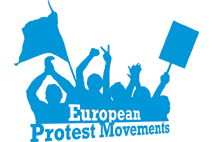 Martin Klimke (HCA, University of Heidelberg, Germany), Joachim Scharloth (University of Zurich, Switzerland) and Kathrin Fahlenbrach (University of Halle, Germany) invite appplications from postgraduate students, early stage researchers (Ph.D. students) and postdocs who are working in the field of European protest movements for their third conference on European Protest Movements since the Cold War: The Rise of a (Trans-)national Civil Society and the transformation of the Public Sphere after 1945. With the generous support of the European Union the conference will take place at the HCA, November 22 – 24, 2007. All travel and accommodation costs within reasonable bounds will be covered by the European Union. Selections will be made by April 15, 2007
Martin Klimke (HCA, University of Heidelberg, Germany), Joachim Scharloth (University of Zurich, Switzerland) and Kathrin Fahlenbrach (University of Halle, Germany) invite appplications from postgraduate students, early stage researchers (Ph.D. students) and postdocs who are working in the field of European protest movements for their third conference on European Protest Movements since the Cold War: The Rise of a (Trans-)national Civil Society and the transformation of the Public Sphere after 1945. With the generous support of the European Union the conference will take place at the HCA, November 22 – 24, 2007. All travel and accommodation costs within reasonable bounds will be covered by the European Union. Selections will be made by April 15, 2007
Martin Klimke (HCA) outlines the aim of the conference: “Whereas protest movements themselves are gradually entering the realms of scholarly analysis in Europe and the U.S., the larger repercussions they caused with respect to the various institutions of society have largely been neglected. When thinking of 1953 in East Germany, 1956 in Hungary, 1968 in all of Europe, the terrorism of the 1970s, as well as 1989 in Eastern Europe, it was, however, the perception of the “establishment” which frequently posed as the embodiment of things to overcome and the major target of criticism. It is therefore rather surprising that the manifold institutional and social reactions to these protest phenomena, both in Eastern and Western Europe as well as in the U.S., have not yet been sufficiently and comparatively explored. An examination of the various ways in which political parties, the business world, the military, trade unions, churches or other segments of society experienced, confronted or even actively contributed to protest movements is, however, essential for assessing the historical significance of these movements and their role in long-term societal changes.”
For further information about the research see European Protest Movements Project can be found on
www.protest-research.eu.
Imprint
Heidelberg Center for American Studies (HCA)
Curt und Heidemarie Engelhorn Palais
Hauptstraße 120
69117 Heidelberg
Tel.: + 49 6221 543710
E-Mail: hca@uni-hd.de
www.hca.uni-hd.de
Distributed by postina.net, Heidelberg
This is a cost-free, non-profit service. No addresses or other information will be forwarded to third parties.


 Graduiertenkolleg
Graduiertenkolleg